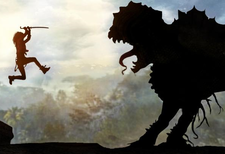Old Gods/Practices
| Seasonal Festivals | |||
|---|---|---|---|
| Festival of Light | Grand Hunt | Equinox Masquerade | Winter March |
| Vernal Equinox | Summer Solstice | Autumnal Equinox | Winter Solstice |
| The Festival of Light involves massive outdoor bonfires to push back the winter. These fires are coloured by alchemical potions to create pools of vibrant colour amidst the snow. Once revellers arrive they are expected to shed their winter furs and find comfort in the balance between the heat of the flame and the ice of the air.
Often lovers will come together at this time dressed, and painted, in matching colours. All revellers dine, dance and duel as an expression of the returning spring. |
Equinox Masquerade of the Old Gods is a day of celebration both in defiance of the encroaching winter and to honour the Masked One; the God of Sun and Moon.
The untamed celebration will be about subverting norms and the mingling of peoples from all walks of life. All while striving for balance. Reverie through dance, feasting, and drinking is usually matched by sparring, hunts, and vigils for the fallen. Though, shielded by the masks, some may lean towards pranks and acts of charity instead. All is in the spirit of good fun, of course. |
The Winter Solstice is a time of pilgrimage for the Followers.
Braving the cold, they strike out into the wilds to find a place of personal significance where they might give thanks, show respect, or challenge the Gods. Usually a very personal affair, occasionally the Followers will travel together to one of the natural wonders of the land. Their return is often met with a celebration of community. | |
| Letter from Omar the Scribe | |
| Message sent to Message to the Emperor | |
| My emperor,
The following passage was taken from documents recovered during the restoration of the first temple. As a result the material within may not hold true to the current incarnation of the faith. ____ The Followers of the Old Gods, or Followers for short, hold few formal ceremonies or rituals. Much as the traditional folklore, which make up their history, the Old Gods keep their sacred adherence as private as possible. Often each family or group of close friends will worship together, using a ritual they derived from the teachings. The practices are so varied that If not for the similarities in language most Followers would hardly recognize each other. One unifying thread is that of tithing. Produce from labour is not turned away, nor coin if that is all that can be offered, but most temples seek odd trinkets - artifacts and relics discovered in the wilds or liberated from inhumans. The blessings provided for such bounty are much sought leading to no end of hopeful offerings. The priests, called Guardians, are professional scholars and inspiring warriors each travelling the land as they see fit. Assisting the people with their plight the Guardians provide crumbs of lore and wisdom to the Followers, and when when no longer needed depart with the words, “I shall return”. It is that return the Followers prepare for, considering what they were told and attempting to unravel the mysteries before time runs out. The worthy and wise are given yet more, moving closer to the uncertain truth. Since the Guardians wander as they wish, the Followers of an area might receive many visits or few with each having the potential to provide a vastly different lesson. Given the sheer scope of lessons most choose to focus on those which speak strongly to them, aligning to one God or another in their exploration of the mysteries. Sometimes the Guardians are so pleased with the progress of an individual they offer them further instruction in one of the temples. Few reject the offer, and most who go return to their families with a deeper understanding and satisfaction with themselves they cannot explain. They often become wise elders, or Celebrants, aiding the others in their community with interpreting the mysteries and tending small shrines. Some who return take a different path to the high level of the Council. They too hold a deeper understanding but speak of their time little and offer less instruction. Somewhat isolated from their community by what they have discovered they are considered somewhat unnerving by the people, and yet where ever they go good fortune and prosperity follows. In the end they are treated much as the shamans of the traditional folklore, respected and yet removed from society. | |
| Omar the Scribe (Scribe) | |



